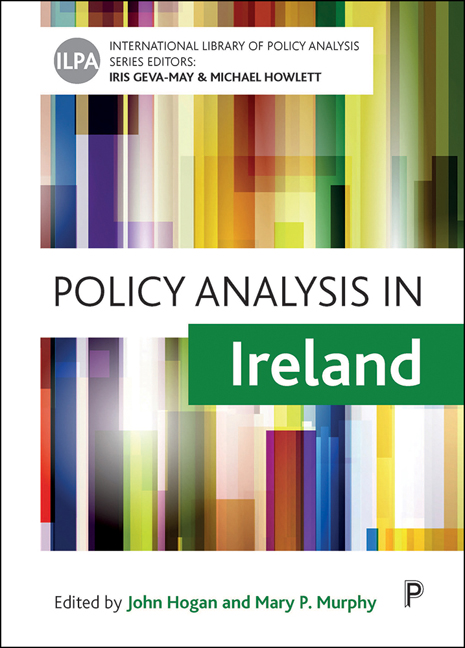Book contents
- Frontmatter
- Contents
- List of figures, tables and boxes
- List of abbreviations
- Notes on contributors
- Editors’ introduction to the series
- Acknowledgements
- Foreword
- Preface
- one Contextualising policy analysis in Ireland
- Part One: History, styles and methods of policy analysis in Ireland
- Part Two: Policy analysis at various levels of government: from local to the EU
- Part Three: Think tanks, interest groups, political parties and gender-based policy analysis
- Part Four: The public, science and the media: the wider policy analysis environment in Ireland
- Index
two - The evolution of economic policy analysis in Ireland
Published online by Cambridge University Press: 18 December 2021
- Frontmatter
- Contents
- List of figures, tables and boxes
- List of abbreviations
- Notes on contributors
- Editors’ introduction to the series
- Acknowledgements
- Foreword
- Preface
- one Contextualising policy analysis in Ireland
- Part One: History, styles and methods of policy analysis in Ireland
- Part Two: Policy analysis at various levels of government: from local to the EU
- Part Three: Think tanks, interest groups, political parties and gender-based policy analysis
- Part Four: The public, science and the media: the wider policy analysis environment in Ireland
- Index
Summary
Introduction
This chapter traces the emergence of modern economic policy analysis in Ireland in the critical industrialisation drives in Ireland's development path from independence in 1922 to joining the then European Economic Community (EEC) in 1973.
At independence, Ireland was in political turmoil, having fought a war of independence and subsequently a civil war. The economy was underdeveloped and predominantly agricultural. Living standards were low and emigration was high. The overarching economic problem was job creation. In the early years of the new independent state, given the political climate, the government's primary focus was on state building and the scope of economic policy was limited. From 1932, a change in government saw the state take a more interventionist role in the economy, adopting an isolationist, protectionist outlook and building economic self-sufficiency through import substitution industrialisation (ISI). This was only vaguely rooted in economic reasoning, founded more on nationalist sentiments than on solid economic analysis. There was a shift in both the use of economic policy analysis and in the approach towards industrialisation from 1948 with a reorientation to outward-looking policies and the encouragement of export-led industrialisation (ELI). This radical change was to transform the country from narrowly focused and insular to outward-looking and cosmopolitan.
Irish economic policy is shaped by the interaction of various stakeholders and interest groups, framed by the changing international environment. As a small, dependent, post-colonial economy, Ireland has always been subject to external influences but has limited bargaining power. This limits the scope of domestic policy making. Ireland's protectionist period largely coincided with the rest of the world looking inwards, following the Great Depression during the 1930s. The shift to outward-looking policy occurred in tandem with the movement towards trade liberalisation after the Second World War. There were also wider domestic social and political influences on economic policy making, including nationalism and the power of the Catholic Church (which was suspicious of economic planning and government intervention, considering these to be aligned with socialism).
While today much of the economic policy analysis is conducted by economists, whether in the public or private sector, in the early years of the state, it was largely undertaken by civil servants, with limited contributions from academia and foreign experts. The Irish economics profession was initially small but expanded over time, as did the quantity and quality of economic analysis.
- Type
- Chapter
- Information
- Policy Analysis in Ireland , pp. 19 - 32Publisher: Bristol University PressPrint publication year: 2021



